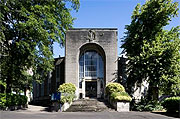Source: Strathclyde University Archives, Ref: OP 4/118/7
Notable People
John Logie Baird
-
John Logie Baird

-
John Logie Baird's matriculation record

Source: University of Glasgow
-
John Logie Baird assisted by Captain Hutchison, erecting the transmitting aerial on the roof at Long Acre, London, 1926.

Source: Strathclyde University Archives, Ref: OP 4/118/17
-
John Logie Baird working on the "Falkirk Transmitter", 1926

Source: Strathclyde University Archives, Ref: OP 4/118/15
-
Programme for the Engineering Society 1927-28 including lecture by J L Baird

Source: University of Glasgow (DC299/1/1/3)
-
John Logie Baird and G B Banks operating a Noctovisor 1929

Source: University of Glasgow
Inventor and Television Engineer
Born 13 August 1888, Scotland.
Died 14 June 1946.
The inventor of television.
Connection to the University of Glasgow: Alumnus
Discover more electrical engineers on the University of Glasgow Story website
Achievements
The following achievement is associated with John Logie Baird:
Inventing television
The first working television system was demonstrated by John Logie Baird on the 26th of January 1926.
Biography
John Logie Baird (1888-1946) was an inventor and pioneer of television who studied Engineering at the University of Glasgow in the session 1914-1915.
Born in Helensburgh on 13 August 1888, John Logie Baird was the youngest child of Rev John Baird, a Church of Scotland minister, and Jessie Morrison Inglis. Baird attended school in Helensburgh, and went on to study for a Diploma in Electrical Engineering at the Royal Technical College, previously known as the Glasgow and West of Scotland Technical College.
In October 1914 Baird matriculated at the University of Glasgow to take classes in Electricity (Pure and Applied), Engineering and Natural Philosophy. Although entitled to sit the examinations for a BSc degree, he chose not to do this and left the University in March 1915.
He applied for military service but was declared medically unfit and joined the Clyde Valley Electrical Power Co as an assistant mains engineer in 1916, resigning two years later to concentrate on his own business interests, inventing and marketing his own products with perhaps the most successful being the ‘Baird undersock’.
Baird achieved fame for his work developing television, giving the world's first demonstration of a practical system in front of members of the Royal Institution on 26 Jan 1926. In 1928 the Baird Television Development Co made the first transatlantic television transmission, and during the 1930s and 1940s succeeded in developing colour television.
Baird returned to the University in 1928 when he gave a lecture to the University of Glasgow's Engineering Society. He delivered this lecture, simply titled 'Television', in the James Watt Engineering Laboratory at 7.30pm on 1st March 1928. He attracted a large audience of 145 when average attendance of these lectures was around 40 in this decade. The Proceedings of the Society record the lecture, describing that Baird explained how the television worked, the difficulties he overcame, and the benefits of a wireless system:
"The greatest distance that moving pictures had been sent over a bare telephone line was from London to Glasgow, but by means of wireless they had been sent across the Atlantic to America."
The Proceedings also record that: "With regard to the future, Mr Baird said that although television was more complex than telephony, it would soon be of commercial importance. Admiral Whittingham, in proposing the vote of thanks, said that Mr Baird was a discoverer in an unexplored country."
He passed away on 14 June 1946 in Bexhill-on-Sea, East Sussex.

